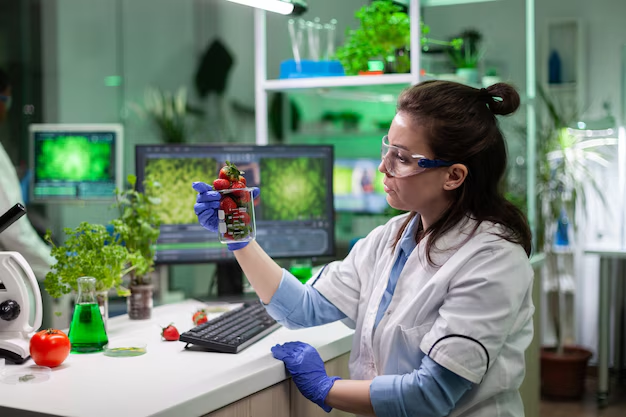Biotechnology is transforming the field of medicine by introducing groundbreaking innovations that improve diagnosis, treatment, and prevention of diseases. From gene editing to personalized therapies, biotechnology is paving the way for a new era in healthcare. In this article, we explore how biotechnology is revolutionizing medicine and its potential to reshape the future of healthcare.
1. The Role of Biotechnology in Medicine
What Is Biotechnology?
Biotechnology refers to the use of living organisms, cells, or biological systems to develop products and technologies that benefit human health. In medicine, biotechnology is utilized for drug development, genetic engineering, diagnostics, and treatment advancements.
Key Areas of Biotechnology in Medicine
Biotechnology encompasses various fields, including:
- Genetic Engineering: Manipulating DNA to correct genetic disorders or create therapies.
- Regenerative Medicine: Developing treatments to repair or replace damaged tissues and organs.
- Pharmacogenomics: Using genetic information to personalize drug treatments.
- Cell Therapy: Harnessing stem cells and other cell-based therapies for regenerative purposes.
2. Biotechnology Innovations in Medicine
Gene Editing and CRISPR Technology
Gene editing, particularly CRISPR-Cas9, has revolutionized the way we treat genetic diseases. By precisely altering DNA, CRISPR enables the correction of mutations that cause disorders such as sickle cell anemia, cystic fibrosis, and muscular dystrophy.
- Potential Applications:
- Correcting genetic mutations in embryos to prevent inherited diseases.
- Treating rare genetic disorders by repairing faulty genes.
Immunotherapy and Cancer Treatment
Biotechnology is transforming cancer treatment through immunotherapy, a method that boosts the body’s immune system to fight cancer cells.
- CAR-T Cell Therapy: Involves modifying a patient’s T cells to attack cancer more effectively.
- Monoclonal Antibodies: Engineered antibodies that target specific cancer cells, improving treatment outcomes with fewer side effects.
Personalized Medicine
Biotechnology enables the development of personalized medicines tailored to an individual’s genetic makeup, lifestyle, and environment.
- Pharmacogenomics: Allows doctors to prescribe drugs that are more likely to be effective based on a patient’s genetic profile.
- Precision Oncology: Treating cancer based on genetic mutations specific to the individual’s tumor.
3. Biotechnology in Drug Development

Biologic Drugs
Biologics are drugs derived from living organisms, such as monoclonal antibodies, vaccines, and gene therapies. These drugs offer more targeted treatments compared to traditional small-molecule drugs.
- Examples:
- Insulin for diabetes management.
- Monoclonal antibodies for autoimmune diseases like rheumatoid arthritis.
Rapid Vaccine Development
The COVID-19 pandemic highlighted the importance of biotechnology in vaccine development. mRNA technology, a breakthrough in biotechnology, was used to develop highly effective vaccines in record time.
- Impact:
- Faster response times to emerging infectious diseases.
- mRNA technology is also being explored for cancer vaccines.
4. Regenerative Medicine: Healing and Repair
Stem Cell Therapy
Stem cell therapy has the potential to repair damaged tissues and organs, offering hope for conditions like heart disease, spinal cord injuries, and neurodegenerative disorders.
- Stem Cells in Action:
- Replacing damaged heart tissue after a heart attack.
- Restoring nerve function in patients with spinal injuries.
3D Bioprinting
3D bioprinting is an innovative technology that uses a patient’s own cells to create tissues and organs. While still in early stages, this technology could one day enable the creation of functional organs for transplantation.
Biotechnology in Diagnostics
Genetic Testing and Screening
Biotechnology has made genetic testing more accessible, allowing for early diagnosis of inherited conditions, cancer risk, and even the likelihood of developing certain diseases.
- Applications:
- Prenatal testing to detect genetic disorders.
- Screening for hereditary cancer mutations like BRCA1 and BRCA2.
Diagnostic Tools for Early Disease Detection
Biotech innovations have led to the development of advanced diagnostic tools that detect diseases earlier, improving treatment outcomes.
- Liquid Biopsies: A non-invasive method to detect cancer through blood tests, enabling early-stage diagnosis and monitoring of treatment efficacy.
6. The Future of Biotechnology in Medicine
AI and Biotechnology Integration
The integration of artificial intelligence (AI) with biotechnology is opening new frontiers in drug discovery, patient monitoring, and disease prediction. AI can analyze vast amounts of data, speeding up research and identifying potential treatments faster.
Organ Transplants and Bioengineering
As bioprinting technology advances, the possibility of creating custom-designed organs for transplant is becoming a reality. This would address the shortage of donor organs and reduce transplant rejection rates.
Conclusion
Biotechnology is undeniably revolutionizing medicine by creating more effective treatments, enhancing diagnostic capabilities, and offering new hope for patients with previously untreatable conditions. From gene editing to personalized therapies, the possibilities are endless. As these technologies continue to evolve, they promise to reshape the future of healthcare, making it more precise, accessible, and effective for all.
FAQs
Q1: How does biotechnology impact cancer treatment?
A1: Biotechnology has led to the development of immunotherapies and targeted treatments, such as CAR-T cell therapy and monoclonal antibodies, which help fight cancer more effectively with fewer side effects.
Q2: What is CRISPR, and how does it work?
A2: CRISPR-Cas9 is a gene-editing technology that allows scientists to precisely alter DNA. It holds the potential to treat genetic disorders by correcting mutations at the DNA level.
Q3: How is biotechnology used in vaccine development?
A3: Biotechnology, particularly mRNA technology, has allowed for the rapid development of vaccines. This technology was used in COVID-19 vaccines and is being explored for cancer vaccines.
Q4: What are stem cells, and how do they contribute to medicine?
A4: Stem cells are undifferentiated cells with the potential to develop into various types of tissue. They are used in regenerative medicine to repair or replace damaged tissues and organs.
Q5: What is the future of biotechnology in healthcare?
A5: The future of biotechnology in healthcare includes advancements in AI-driven drug discovery, personalized medicine, bioprinting for organ transplants, and enhanced diagnostics.


